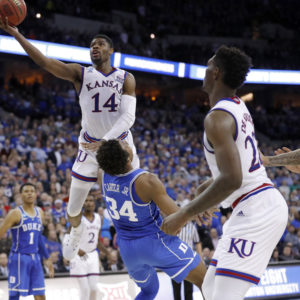I’m a pretty big college basketball fan — not paint-my-chest big, but big — and I know one reform I’d make were Supreme Commissioner power bestowed upon me: My team would always win. But I don’t have such power, and there are good arguments for all sorts of college roundball reforms.
In light of all these reasonable ideas, no decisions should come from hypothetical college sports dictators. They should evolve from the free interplay of schools, athletes, fans, broadcasters and everyone else with a stake in the game.
The biggest threat of imposed problem-solving comes from the federal government. In part, this is because the FBI is in the midst of an investigation into under-the-table deals delivering money from shoe companies, through coaches, to the families of top players and prospects. But even before this, Washington politicians have threatened intervention when college sports haven’t gone their way.
In 2009, with many senators upset that their state flagship schools were kept out of football’s Bowl Championship Series, the Senate antitrust subcommittee held hearings about the BCS. In the midst of feverish conference realignment in 2011, Rep. John Conyers, D-Michigan, called for “hearings regarding antitrust and due process issues relating to intercollegiate athletics, with a particular focus on the impact of recent realignments and legal disputes on smaller, minority conferences and athletes.”
Of course if you are a fan of the smaller guys who don’t often get to compete for championships, you’d like to see rules changed so they can contend more often. And who but a Wahoo didn’t root for UMBC? But what if that meant less compelling games, and sports lost big bucks as TV viewership dissipated? The little guys would do better but the sports as a whole would suffer. Is either clearly the right outcome?
How about paying athletes?
People often can’t help but titter when NCAA ads come on in the midst of gleaming, made-for-TV, money-raking game broadcasts that emphasize “student” in “student athletes.” It’s not a knock on the athletes, but recognizing the reality of big-time college sports.
For one thing, many players spend 40 hours a week on their sports; basically, a full-time job. The conceit is even more dubious given the one-and-done phenomenon in college hoops, in which it is understood by all involved that top prospects will depart for the pros after their inaugural college year. Finally, a lot of athletes, at least in top-level football and basketball, generate big bucks. But except for the cost of tuition, fees, room and board that redounds to them, the revenue all accrues to coaches — often the highest paid public employees in their states — and schools.
But if players got paid it could blow up the whole notion that big-time college sports is about education, and could seriously undermine support for college athletics. And thinking about those smaller schools again, paying athletes would stack a whole lot more gargantuan linemen on the side of big institutions, tilting even further a playing field already heavily slanted their way. Only the really big schools — the Alabamas (football) and Kentuckys (basketball), not the Akrons and Kennesaw States — would likely have the revenue to pay numerous, top-flight football and basketball players lots of money.
Pay the athletes from whom others are profiting, or level the playing field? What a choice!
What all these competing values and concerns tell us is not what reforms to impose, but that there is no one, clear answer. From a public policy perspective, that means reforms should come from the bottom up — lots of people with numerous vantage points freely negotiating with each other. Schools deliberating with other schools; athletes with institutions; broadcasters with schools, conferences and umbrella groups like the NCAA; and fans with their eyeballs and wallets choosing what they’ll watch.
This may even include shoe companies working with schools to send money to players’ families. The NCAA or any other governing body that schools voluntarily join could prohibit that, but how college sports is managed should not be imposed from above. Indeed, right now companies legally spend lots of money to get their swooshes and stripes on uniforms, in locker rooms and on coaches’ outfits. The only meaningful difference is that the bucks stop right before players’ pockets.
That might be the right or wrong thing for college sports, but it should not be a federal issue.

